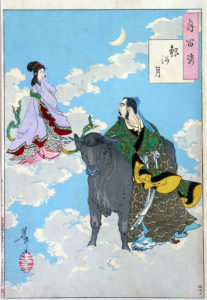There are many holidays around the world that celebrate love. Of course the most well known and widely extended of these is Valentine’s Day, but there are also more localized days that celebrate romantic love such as the Romanian Dragobete or St. George’s Day in Catalunya and the Chinese celebration of Qixi which I would like to discuss today. Qixi falls on the 7th day of the 7th lunar month, this year coinciding with August 25th on the western calendar. Due to the date on which it falls according to the lunar calendar, Qixi is also known as double 7th festival. The number 7 is considered lucky for relationships in Chinese numerology.

The first reference to Qixi dates back 2600 years. The festival takes its inspiration from the story of two lovers named Zhinü and Niulang, the weaver and the cowherd. They were very much in love and married in secret. Zhinü was the daughter of the Jade Emperor, the ruler of Heaven, and he did not approve of their marriage and therefor separated them in the heavens. Zhinü and Niulang are represented by the stars Vega and Altair that are located on opposite sides of the Milky Way. According to legend, one day a year a flock of magpies creates a bridge that allows them to spend the day together and express their love. For this reason, this date is considered an auspicious time to find a suitable partner for marriage.
Many of the great poets of China have composed beautiful verses celebrating these two celestial lovers but the following short poem is my favorite because it makes reference to autumn which is my favorite season. It was composed in the Tang Dynasty by famed poet Du Mu.
銀燭秋光冷畫屏,
輕羅小扇撲流螢.
天階夜色涼如水,
坐看牽牛織女星.
A candle flame flickers against a dull painted screen on a cool autumn night.
She holds a small silk fan to to flap away the fireflies.
Above her hangs celestial bodies as frigid as deep water.
She sat there watching Niulang and Zhinü pining for each other in the sky.
(Translation by Betty Tseng)
Over the centuries, many traditions have sprung up around the festival of Qixi. Young women will often worship at temples and make offerings to the celestials asking for a suitable life partner. Newlyweds pay homage to Zhinü and Niulang asking for a happy marriage. There persists a custom of making a bridge out of incense sticks and flowers to represent the bridge built by the magpies in the legend and then burning it as an offering. In more recent years, Qixi has come to be referred to as Chinese Valentine’s Day and has even taken on several of the customs associated with this western holiday such as giving gifts and romantic dinners with loved ones.
I hope you have enjoyed this brief post about Qixi and as always I wish you peace, happiness and an abundance of blessings on this magical day and always!